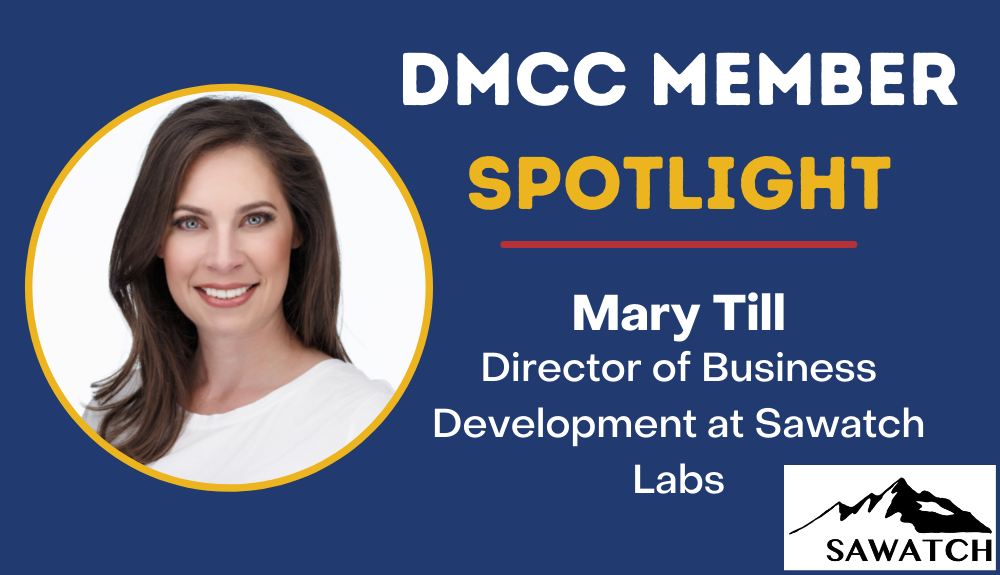We are ecstatic to have Sawatch Labs as one of our stakeholders at Denver Metro Clean Cities. Sawatch Labs uses advanced analytics to provide fleets with actionable recommendations and help them optimize their fleet operations. We spoke with Mary Till, Director of Business Development at Sawatch Labs and Board Secretary at DMCC, about her involvement with DMCC and her work with Sawatch Labs. Keep reading to hear about Sawatch’s fleet support, their work with Xcel Energy and what they are looking forward to in the future.
Company: Sawatch Labs 
Location: Denver, CO
*Note: These answers are sumarized from and interview with Mary Till from Sawatch Labs
What is your engagement with Clean Cities and how did it begin?
I am currently the board secretary for the Denver Metro Clean Cities Coalition and have been since January, 2020. Since my company operates in the electric vehicle space, when my engagement started I was attending the DMCC meetings and stakeholder events to learn more about the industry and meet people in the industry as well as others we can potentially provide our services to. Through these meetings I got to know Bonnie and at that point she already had a relationship with Sawatch labs, so I think it was a natural fit for me to come onto the DMCC board. Based on the current climate, EVs are in high demand and there’s a growing need for utilities to help fleets move toward electrification and understand how to convert a large number of vehicles (where to start, how much charging infrastructure to install, etc.). It made sense that DMCC wanted to bring someone to the board who had EV and fleet experience to help make those connections.
An interesting project I read about on your website is the Fleet Electrification Advisory Program that you are working on with Xcel Energy, can you elaborate on what this project is?
The program goal is really to help government and commercial fleets in the Xcel territory of Colorado identify opportunities to successfully add electric vehicles to their fleet and understand what the growing energy demands will be as they continue to add more and more EVs. We’re providing deliverables both to fleets to help them make informed procurement decisions and understand where charging infrastructure would largely make sense based on their operations, and to Xcel to provide them with information that can help them right-size the kind of infrastructure these fleets need in order to support the EVs fleets are bringing on. This isn’t just for the vehicles that fleets are buying this year either, it’s also for the many they will bring on in the future – it’s planning for today’s and tomorrow’s needs from an energy and infrastructure standpoint. We are very excited to be helping so many local fleets electrify successfully and contribute to cleaner air quality right here in our own backyard. This year we are also pushing into more of the medium and heavy-duty portions of fleets (typically we model light-duty) and are hoping to add some schools and do some school-bus modeling in the future.
What is important to Sawatch Labs this week? How does your work with the Fleet Electrification Advisory Program tie into that?
Fundamentally, everything we do at Sawatch Labs is based on analyzing granular data to make informed decisions and help fleets reach their potential. The work we’re doing with Xcel for the Fleet Electrification Advisory Program ensures that fleets that are just moving into electrification are making successful decisions so they can promote further electrification – we want to help make sure they do it right the first time. As I mentioned before, it’s helping inform not just the infrastructure they need for the few EVs they’re bringing on this year, but also for when they reach 50% or 100% electrification and what those energy demands are going to look like. The energy/infrastructure piece is key and by using fleets’ actual operations data we can ensure the right fit. I think there is still a high demand for the suitability assessment and energy modeling work we are doing for electrification and there’s so much more that needs to be done with it in the fleet space – we are starting to see momentum federally, so I can only assume that interest in programs like this will grow. We’re excited to help fleets either respond to policy or inform reasonable policy based on what’s possible today with available models on the market and their own fleet operations.

Sawatch Labs supports fleets by providing them with operational data analysis using their analytics, how does that process work?
Our analytics products are cloud-based, secure web applications where users can access their operational results. We guide users through what those results mean, how to interpret them and how to configure their experience to provide the best output for their fleet. We use telematics data as our fundamental data source because we believe it’s the best way to determine operational fit. We provide both economic and operational fit, and while you can get close with your economic fit using a cost calculator, to really understand the impacts of bringing EVs into your fleet you need minute-by-minute driving and operational data, and the way we gather that is through telemetry. Telemetry is the basis of all our analytics. We are data agnostic in the sense that we can use any telemetry, so our tools are designed to ingest data from all the major telematics providers in North America and provide actionable, accurate outputs to help fleets make decisions. Additionally, if fleets don’t have telematics, we are a reseller for Geotab. We thought it was natural to do our feasibility studies with Geotab because they support over 100 EV models and allow users to see all the EV specific datasets that fleets are interested in.

How has your relationship and involvement with Denver Metro Clean Cities and Drive Electric Colorado helped you achieve your sustainability goals? What can we continue to do to support Sawatch’s efforts?
As a company, our relationship with DMCC helps us better understand and reach the kinds of businesses and governments that really need support. It also keeps us in tune with what’s available here locally for fleets in regards to programs and incentives as well as the policy that’s driving all of this. The network through DMCC benefits us by helping find a good match for our services and where we can support locally. It also really benefits the fleets and customers we work with because we have all these additional resources at our fingertips through the network. We just want to do more work in our backyard – we don’t have a big company, so we don’t have specific sustainability goals, but we do have goals of serving those in our state and our local area. I feel like DMCC is already doing great work to help support Sawatch Labs. Bonnie finds creative ways to bring us into webinars and she makes good introductions when needed. In a lot of ways I feel like I can turn the question and say “how can I help better serve DMCC and their board?”. Just being a part of this organization has been so rewarding for professional growth, networking and having a better understanding of what’s happening in our state.
What do you hope to collaborate on with DMCC in the future?
I really want to get out and do more Ride & Drives. I think we’re going to see more models becoming available in the next couple years so I’m excited to get out to meet people and engage in those events, even if it’s just as an attendee. It would also be great to do more educational sessions on a regular basis. I think we’ll have some interesting “look-backs” and lessons learned for projects we’re engaged with or wrapping up now, and in a few months we’ll have a lot of interesting information that I’d love to share with our local audience, if it makes sense. Honestly I’m really open to ideas and I feel like we’re just getting started.
See more DMCC Member Spotlights or learn more about joining DMCC today!



